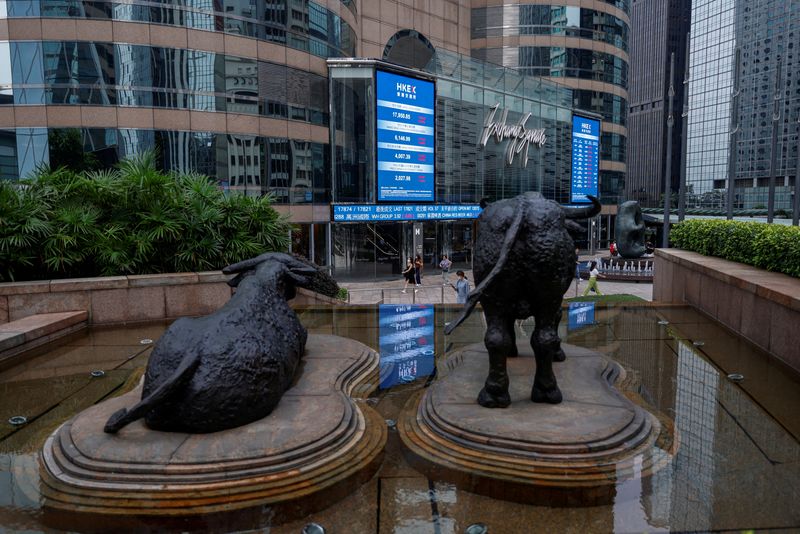
© Reuters. FILE PHOTO: Bull statues are placed in font of screens showing the Hang Seng stock index and stock prices outside Exchange Square, in Hong Kong, China, August 18, 2023. REUTERS/Tyrone Siu/File Photo
AXJO
-0.56%
Add to/Remove from Watchlist
Add to Watchlist
Add Position
Position added successfully to:
Please name your holdings portfolio
Type:
BUY
SELL
Date:
Amount:
Price
Point Value:
Leverage:
1:1
1:10
1:25
1:50
1:100
1:200
1:400
1:500
1:1000
Commission:
Create New Watchlist
Create
Create a new holdings portfolio
Add
Create
+ Add another position
Close
JP225
-0.61%
Add to/Remove from Watchlist
Add to Watchlist
Add Position
Position added successfully to:
Please name your holdings portfolio
Type:
BUY
SELL
Date:
Amount:
Price
Point Value:
Leverage:
1:1
1:10
1:25
1:50
1:100
1:200
1:400
1:500
1:1000
Commission:
Create New Watchlist
Create
Create a new holdings portfolio
Add
Create
+ Add another position
Close
By Caroline Valetkevitch
NEW YORK (Reuters) – Oil, U.S. Treasuries and gold prices rose on Friday, with crude soaring nearly 6%, on safe-haven buying driven by the escalating Middle East conflict as Israel urged civilians to leave the northern Gaza Strip.
Brent crude surged 7.5% in the week since the conflict began, posting its highest weekly gain since February, as investors priced in a chance of escalation in the world’s top oil producing region.
On Wall Street, the S&P 500 ended lower despite upbeat results from big U.S. banks on Friday, which marked the unofficial start of the third-quarter reporting period for S&P 500 companies.
Weak U.S. consumer data also weighed on stocks. U.S. consumer sentiment deteriorated in October, with households expecting higher inflation over the next year.
Shares of JPMorgan were up 1.5% after it reported a 35% profit increase from the year-ago quarter.
The Israeli military called for civilians to leave Gaza City ahead of an anticipated ground invasion in response to devastating attacks by Hamas militants at the weekend.
The yield on 10-year Treasuries was last down 8.2 basis points at 4.629%.
Spot gold added 3.2% on the day to $1,928.99 an ounce, and had its biggest weekly percentage gain since March.
Brent futures rose $4.89, or 5.7%, to settle at $90.89 per barrel, and U.S. crude closed $4.78, or 5.8%, higher at $87.69 a barrel.
“The goal is to get into a safe asset that would work if the ground assault gets bad over the weekend,” said Marvin Loh, senior global macro strategist at State Street (NYSE:STT) in Boston.
“Everything that’s going on in the Middle East is getting more and more unfortunately depressing and seems to have the potential to get worse,” he said.
In stocks, the Dow Jones Industrial Average rose 39.15 points, or 0.12%, to 33,670.29, the S&P 500 lost 21.83 points, or 0.50%, to 4,327.78 and the Nasdaq Composite dropped 166.99 points, or 1.23%, to 13,407.23.
The pan-European STOXX 600 index lost 0.98% and MSCI’s gauge of stocks across the globe shed 0.81%.
The dollar was also helped by safe-haven buying driven by the escalating Middle East conflict.
The dollar index, which measures the U.S. currency against six of its major peers, ticked up 0.11% to 106.63. The index, which jumped 0.8% on Thursday, its biggest one-day rise since March 15, is on pace to finish the week up 0.5%.
Data earlier on Friday showed China’s consumer prices were flat in September, while factory-gate prices shrank more slowly, indicating deflationary pressures persist, while exports and imports continued to contract at a slower pace.
Source: Investing.com




























